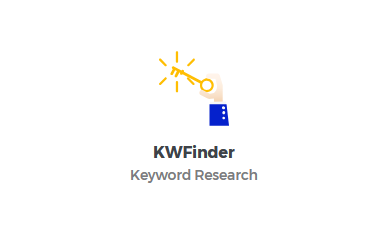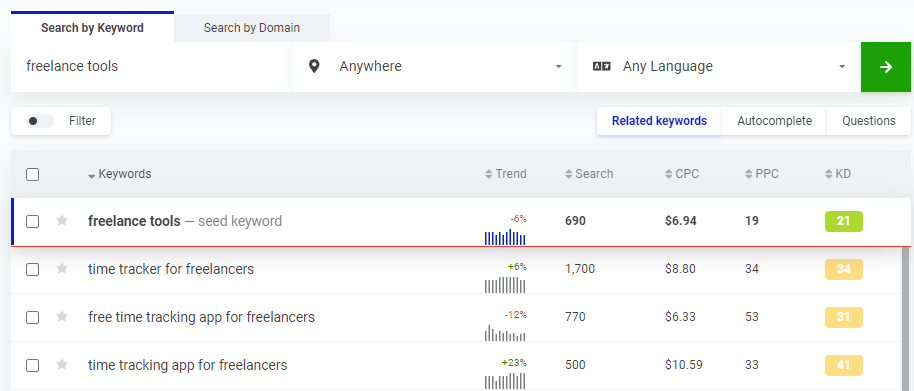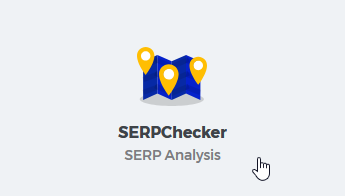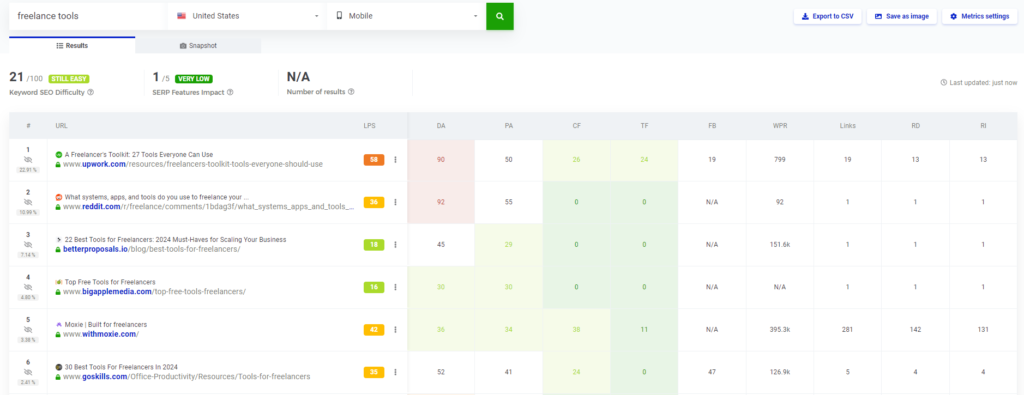If you’ve ever tried to create content for a blog, website, or online business, you’ve probably heard of „keyword research„. But what does that even mean, and why is it important? Don’t worry, you’re not alone in wondering. Keyword research is one of those things that sounds more complicated than it actually is – and today, we’re going to break it down in simple terms.
With the right approach (and the right tools), keyword research can be fun and incredibly effective for driving traffic to your site. One tool that can help make the whole process smoother is Mangools, a user-friendly keyword research tool designed with beginners in mind.
So, whether you’re launching a blog, starting an online store, or just curious about how SEO works, you’re in the right place. Let’s dive in and explore how you can use keyword research to set your content up for success!
An overview of the most important points:
- What is Keyword Research? Finding search terms people type into Google and other search engines.
- Why is it Important? To align your content with what people are actually searching for.
- Basic Steps in Keyword Research: From brainstorming to choosing the best keywords.
- Using Mangools for Keyword Research: A beginner-friendly guide to the tool.
- Evaluating Keywords: Balancing search volume, competition, and relevance.
- Tips for Success: Common mistakes to avoid and practical tips to get started.
What is Keyword Research?
Simply put, keyword research is the process of identifying the words and phrases people are typing into search engines like Google. When someone searches for „best vegan pizza recipe,“ the words „best vegan pizza recipe“ are the keywords.
But here’s where it gets interesting: by knowing which keywords people are searching for, you can tailor your content to meet those exact needs. This increases the chances of people finding your content, which can lead to more traffic, higher rankings in search results, and eventually, more engagement or sales.
In short: Keyword research helps you align your content with what people are actively looking for.
Why is Keyword Research Important?
Imagine you’re throwing a party. Wouldn’t it be a good idea to ask your friends what kind of music they like beforehand? Otherwise, you might end up with an empty dance floor. The same concept applies to keyword research.
Without knowing what your audience wants (i.e., the keywords they’re searching for), your content could fall flat, lost somewhere on page 97 of Google. But with solid keyword research, you’re creating content that your audience is eager to find.
Here’s why keyword research is crucial:
- It helps you create relevant content: You’re writing about topics that people actually care about.
- It improves SEO (Search Engine Optimization): More targeted keywords = better chances of ranking on Google.
- It drives traffic: More visibility in search engines means more visitors to your site.
- It increases conversion rates: When you understand the intent behind the keywords, you can match your content to exactly what people need.
The Basic Steps of Keyword Research (Beginner-Friendly Version)
Don’t worry if this all sounds a bit technical; we’ll go through it step-by-step. Ready?
1. Brainstorm Seed Keywords
Start by brainstorming broad terms related to your niche. These are called seed keywords. For example, if you’re running a fitness blog, seed keywords might include “home workouts,” “healthy diet,” or “weight loss tips.”
Seed keywords are just the starting point. From here, we’ll dig deeper to find more specific, high-value keywords.
2. Use a Keyword Research Tool (like Mangools)
Once you have a few seed keywords, it’s time to plug them into a keyword research tool. Mangools is a fantastic choice for beginners because it offers a user-friendly interface and simple instructions.
Here’s a quick guide on how to use it:
1: Sign up for Mangools (they offer a free trial if you want to dip your toes in first).

2: Open the KWFinder tool (one of the tools in the Mangools suite).

3: Enter one of your seed keywords (e.g., “home workouts”) in the search bar.

Mangools will give you a list of related keywords, including search volume, difficulty score, and competition.

3. Evaluate Your Keywords
Once you have your list of potential keywords, you need to evaluate them based on three main factors:
- Search Volume: How many people are searching for this keyword each month?
- Keyword Difficulty (KD): How hard will it be to rank for this keyword?
- Relevance: Does this keyword align with the content you want to create?
In Mangools, you’ll see these metrics right next to each keyword. For beginners, it’s often best to target low to medium difficulty keywords that still have a decent search volume. This gives you a better chance of ranking without competing against the giants of the internet.
4. Choose Long-Tail Keywords
While short, high-traffic keywords like „workouts“ might be tempting, they’re often extremely competitive. Instead, look for long-tail keywords. These are more specific phrases (e.g., “10-minute home workout for beginners”), which are less competitive but still have search traffic.
Long-tail keywords may not bring as many visitors, but the visitors they do bring are usually more targeted and engaged.
5. Analyze Competitors
Before committing to a keyword, it’s smart to check out your competition. This doesn’t mean hacking into their SEO strategies (though that would be cool), but simply Googling the keyword to see who ranks on the first page.
Mangools’ SERPChecker tool can help you analyze the strength of the top-ranking pages for any keyword. If the top results are filled with high-authority sites like Amazon, it might be tough to compete. But if you see smaller, more niche websites, it could be an opportunity.

Step-by-Step Guide: Using Mangools for Keyword Research
Now that we’ve covered the basics, let’s dive deeper into how you can use Mangools specifically for keyword research.
Step 1: Set Up Your Mangools Account
Head to Mangools and set up your account. You can start with a free trial to get a feel for it, but I recommend upgrading to a paid plan once you’re ready for more advanced features.
Step 2: Start With KWFinder
This is the core tool for finding keywords. Here’s how you use it:
- Open KWFinder and type in one of your seed keywords (e.g., “vegan pizza recipe”).
- Mangools will return a list of related keywords. Each keyword comes with data on search volume, keyword difficulty, and trends.
Step 3: Analyze the Results
Look at the following metrics for each keyword:
- Search Volume: Aim for keywords with at least 100–1,000 searches per month.
- Keyword Difficulty: The lower the number, the easier it is to rank. For beginners, aim for keywords with a difficulty score under 40.
- Search Trends: Check if interest in the keyword is growing or declining over time.
Step 4: Pick Your Winning Keywords
Once you’ve analyzed your keyword list, pick a few to focus on. Ideally, you want a mix of low-difficulty, long-tail keywords and a few medium-difficulty keywords to work towards as your site grows.
Step 5: Check Competitors Using SERPChecker
Before you commit to a keyword, use the SERPChecker tool to see who’s ranking in the top 10 for that keyword. This helps you gauge how competitive the keyword is.

Final Tips for Keyword Research Success
- Don’t Get Stuck on High-Volume Keywords It can be tempting to chase keywords with massive search volumes, but they often come with fierce competition. Instead, start small with low-volume, niche keywords.
- Use Long-Tail Keywords These are your secret weapon. They might not have as much traffic, but they bring in more targeted visitors, which can lead to higher engagement.
- Track Your Results Once you start ranking for keywords, track your progress. Mangools has tools like SERPWatcher to help you keep an eye on your rankings over time.
- Create Content That Matches Search Intent Understanding why someone is searching for a particular keyword is just as important as the keyword itself. Are they looking for information, a product to buy, or step-by-step instructions? Tailor your content accordingly.
Keyword Research for Beginners
Keyword research might seem daunting at first, but with the right tools and a clear process, it’s absolutely manageable. By following the steps outlined here and using a tool like Mangools, you’ll be well on your way to finding the best keywords for your content – and driving traffic to your site in no time.
So, what are you waiting for? Dive into Mangools, start experimenting, and watch your traffic grow!
Hope this guide helps you navigate the world of keyword research. Happy keyword hunting!